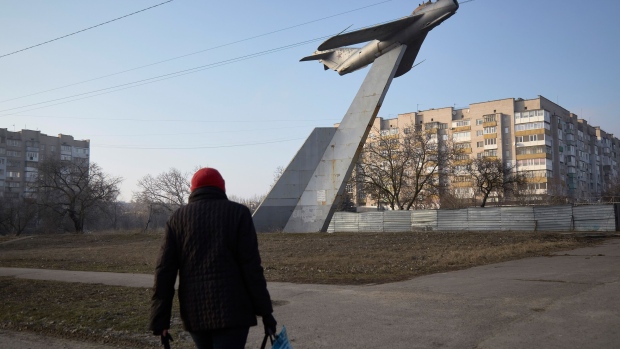Feb 18, 2022
Lavrov to Meet Blinken Next Week, U.S. Says: Ukraine Update
, Bloomberg News

(Bloomberg) -- Russian Foreign Minister Sergei Lavrov agreed to meet U.S. Secretary of State Antony Blinken for talks in Europe next week, as tensions rose over Moscow’s military buildup near Ukraine. On Thursday, President Joe Biden warned that the probability of an invasion of Ukraine is still “very high.”
Russia told the U.S. in its official response to security proposals from Washington that it has no plans to attack, and officials in Moscow have repeatedly dismissed U.S. warnings as “hysteria” and propaganda.
Biden will speak with transatlantic leaders on Friday about the Russian troop buildup. German Foreign Minister Annalena Baerbock reiterated a call for “serious” dialog on security and said Russia needs to provide evidence it is withdrawing troops and show “concrete willingness to negotiate.”
Key Developments
- U.S. Ramps Up Ukraine Warnings as Russia Denies Invasion Plans
- Ukraine Crisis Gave the EU Some Mojo. What Now?: Lionel Laurent
- Stocks Tumble, Bonds Rally in Flight-to-Safety Bid: Markets Wrap
- Ukraine, Russia-Backed Separatists Allege Cease-Fire Violations
- Where Military Forces Are Assembling Around Russia and Ukraine
All times CET:
Germany Regrets Russia to Skip Munich Conference (7 a.m.)
Baerbock said it’s regrettable that no Russian representatives will attend the Munich Security Conference that starts on Friday.
“We are ready for a serious dialogue about security for all,” Baerbock said. “But we also need serious de-escalation steps from Russia.”
The Munich conference is an annual event to discuss transatlantic security issues. The U.S. delegation includes Vice President Kamala Harris and Blinken, who will take part in a Q&A with Baerbock on Friday afternoon. Ukraine’s President Volodymyr Zelenskiy is scheduled to speak on Saturday.
Lavrov Agrees to Meet Blinken, U.S. Says (3:15 a.m.)
Lavrov has agreed to meet Blinken for talks in Europe next week, Ned Price, a State Department spokesman, said on Thursday night.
The Russian response came hours after Blinken, at the United Nations, appealed for a diplomatic solution to the Ukraine crisis.
“The Russians have responded with proposed dates for late next week, which we are accepting, provided there is no further Russian invasion of Ukraine,” Price said in a statement. “If they do invade in the coming days, it will make clear they were never serious about diplomacy.”
U.S. Senate Passes Resolution in Support of Ukraine (3 a.m.)
The U.S. Senate, after being unable to agree on legislation threatening sanctions on Russia, on Thursday night passed a non-binding resolution stating “unwavering” U.S. support for Ukraine.
The resolution, approved by voice vote, condemned the 2014 annexation by Russia of the Crimean peninsula as well as expressed support for “an independent and democratic Ukraine against any further Russian military invasion and for other purposes.”
Introduced by a bipartisan group of senators including Democrats Bob Menendez of New Jersey and Jeanne Shaheen of New Hampshire and Republicans Rob Portman of Ohio and Jim Risch of Ohio, the resolution also denounces the current Russian troop buildup on Ukraine’s borders and encourages Biden to “use all tools” at U.S. disposal to “impose significant costs” should Russia invade Ukraine.
Japan’s Kishida Speaks With Putin (12:15 a.m.)
Japanese Prime Minister Fumio Kishida spoke by telephone on Thursday with Russian President Vladimir Putin about the situation in Ukraine, according to a statement from the Japanese government. The call lasted about 25 minutes.
Kishida said Japan was monitoring the unfolding events “with grave concern,” and urged finding an acceptable diplomatic situation “rather than an unilateral change of the status quo by force,” the Japanese government said in the statement.
©2022 Bloomberg L.P.